Small Business and Entrepreneurship Impact on Social Economy
VerifiedAdded on 2021/01/01
|17
|5313
|80
AI Summary
ENTREPRENEURSHIP INTRODUCTION 1 LO 1 1 P1 Different types of entrepreneurial ventures and explain typology and relate it with entrepreneurship1 P2 Similarities and differences between entrepreneurial ventures 2 LO 2 5 P3 Interpret and assess relevant data and statistics to illustrate that how micro and small business impact on economy5 P4 Importance of small businesses and start-ups to growth of the social economy 7 LO 3 8 P5 Characteristics, traits and skills of successful entrepreneurs that differentiate from other business
Contribute Materials
Your contribution can guide someone’s learning journey. Share your
documents today.

ENTREPRENEURSHIP
Secure Best Marks with AI Grader
Need help grading? Try our AI Grader for instant feedback on your assignments.
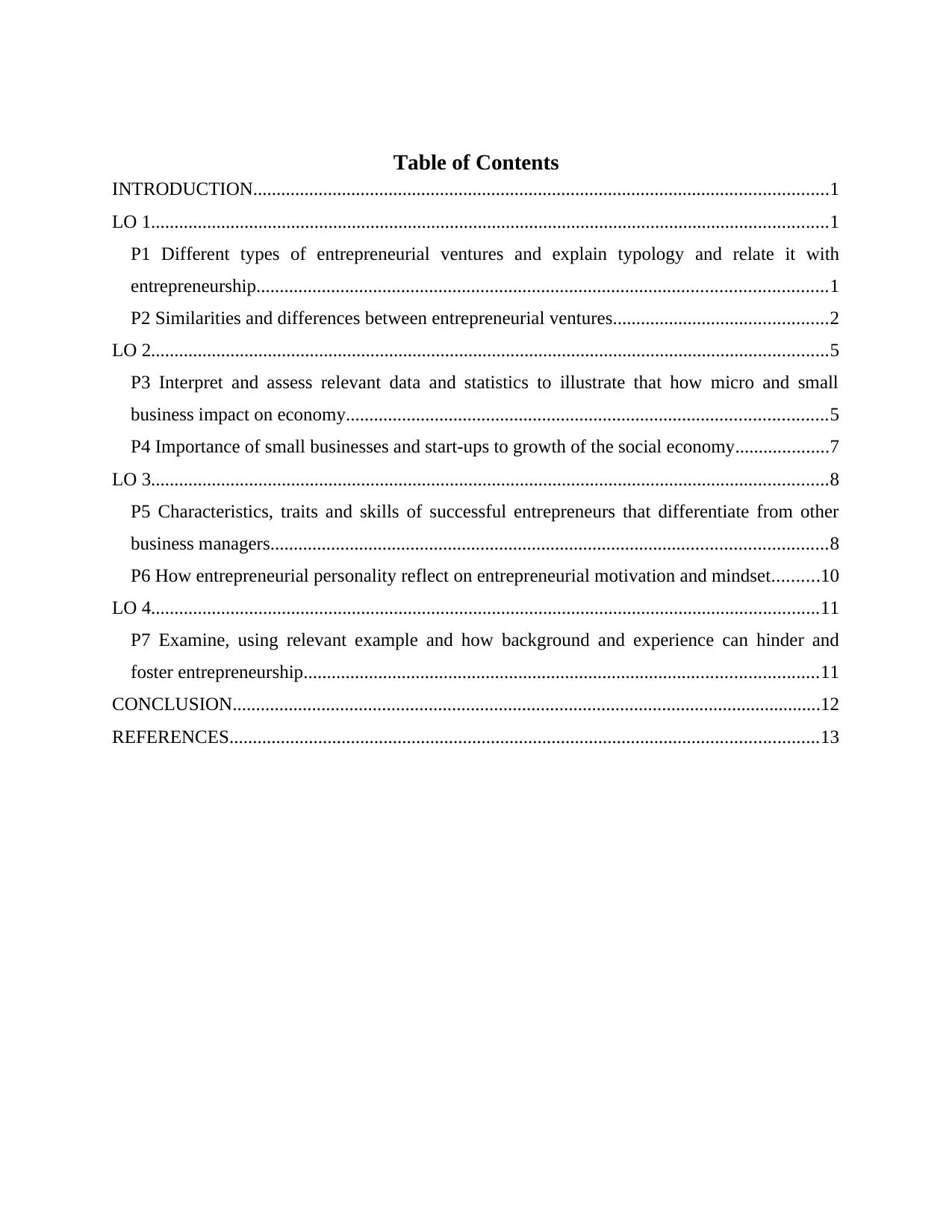
Table of Contents
INTRODUCTION...........................................................................................................................1
LO 1.................................................................................................................................................1
P1 Different types of entrepreneurial ventures and explain typology and relate it with
entrepreneurship..........................................................................................................................1
P2 Similarities and differences between entrepreneurial ventures..............................................2
LO 2.................................................................................................................................................5
P3 Interpret and assess relevant data and statistics to illustrate that how micro and small
business impact on economy.......................................................................................................5
P4 Importance of small businesses and start-ups to growth of the social economy....................7
LO 3.................................................................................................................................................8
P5 Characteristics, traits and skills of successful entrepreneurs that differentiate from other
business managers.......................................................................................................................8
P6 How entrepreneurial personality reflect on entrepreneurial motivation and mindset..........10
LO 4...............................................................................................................................................11
P7 Examine, using relevant example and how background and experience can hinder and
foster entrepreneurship..............................................................................................................11
CONCLUSION..............................................................................................................................12
REFERENCES..............................................................................................................................13
INTRODUCTION...........................................................................................................................1
LO 1.................................................................................................................................................1
P1 Different types of entrepreneurial ventures and explain typology and relate it with
entrepreneurship..........................................................................................................................1
P2 Similarities and differences between entrepreneurial ventures..............................................2
LO 2.................................................................................................................................................5
P3 Interpret and assess relevant data and statistics to illustrate that how micro and small
business impact on economy.......................................................................................................5
P4 Importance of small businesses and start-ups to growth of the social economy....................7
LO 3.................................................................................................................................................8
P5 Characteristics, traits and skills of successful entrepreneurs that differentiate from other
business managers.......................................................................................................................8
P6 How entrepreneurial personality reflect on entrepreneurial motivation and mindset..........10
LO 4...............................................................................................................................................11
P7 Examine, using relevant example and how background and experience can hinder and
foster entrepreneurship..............................................................................................................11
CONCLUSION..............................................................................................................................12
REFERENCES..............................................................................................................................13

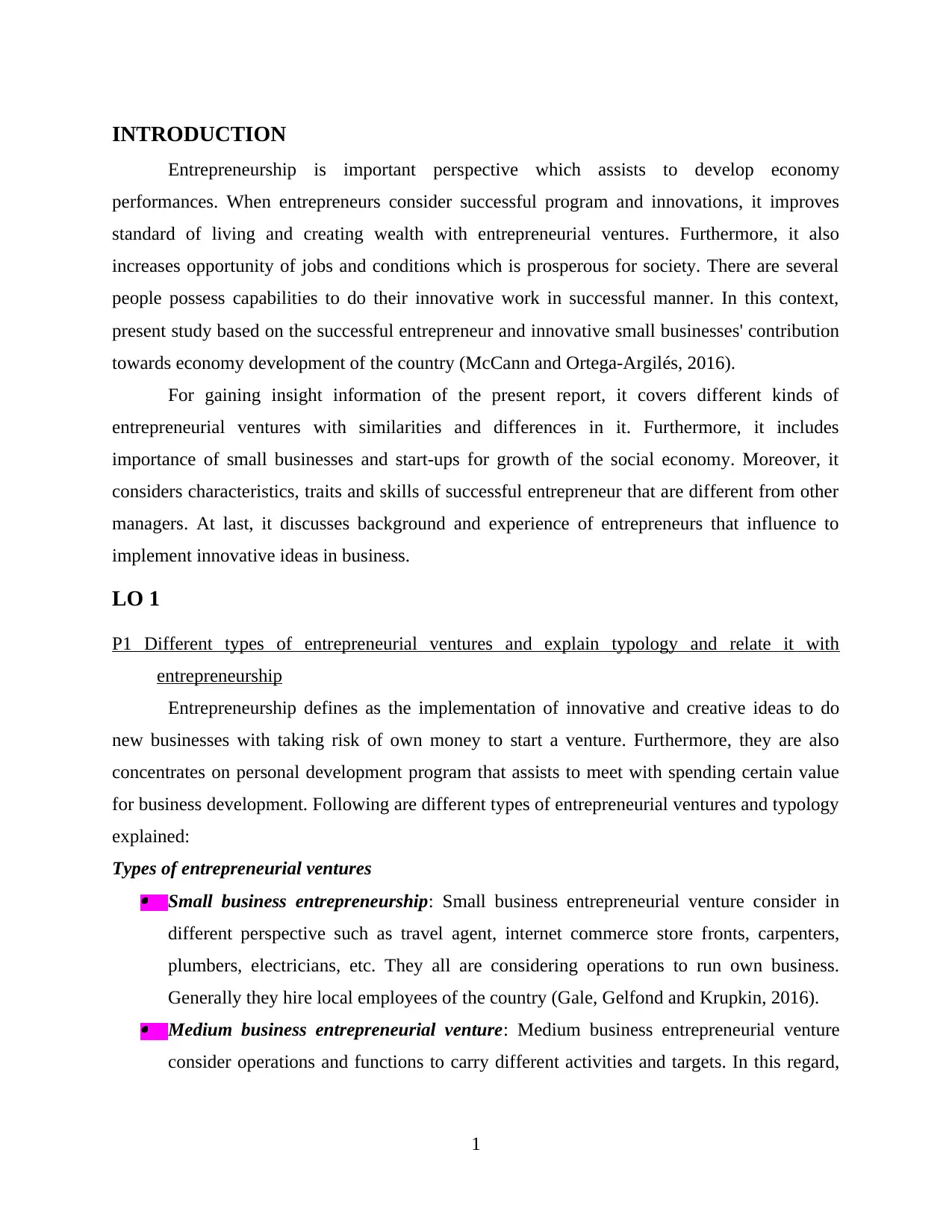
INTRODUCTION
Entrepreneurship is important perspective which assists to develop economy
performances. When entrepreneurs consider successful program and innovations, it improves
standard of living and creating wealth with entrepreneurial ventures. Furthermore, it also
increases opportunity of jobs and conditions which is prosperous for society. There are several
people possess capabilities to do their innovative work in successful manner. In this context,
present study based on the successful entrepreneur and innovative small businesses' contribution
towards economy development of the country (McCann and Ortega-Argilés, 2016).
For gaining insight information of the present report, it covers different kinds of
entrepreneurial ventures with similarities and differences in it. Furthermore, it includes
importance of small businesses and start-ups for growth of the social economy. Moreover, it
considers characteristics, traits and skills of successful entrepreneur that are different from other
managers. At last, it discusses background and experience of entrepreneurs that influence to
implement innovative ideas in business.
LO 1
P1 Different types of entrepreneurial ventures and explain typology and relate it with
entrepreneurship
Entrepreneurship defines as the implementation of innovative and creative ideas to do
new businesses with taking risk of own money to start a venture. Furthermore, they are also
concentrates on personal development program that assists to meet with spending certain value
for business development. Following are different types of entrepreneurial ventures and typology
explained:
Types of entrepreneurial ventures Small business entrepreneurship: Small business entrepreneurial venture consider in
different perspective such as travel agent, internet commerce store fronts, carpenters,
plumbers, electricians, etc. They all are considering operations to run own business.
Generally they hire local employees of the country (Gale, Gelfond and Krupkin, 2016). Medium business entrepreneurial venture: Medium business entrepreneurial venture
consider operations and functions to carry different activities and targets. In this regard,
1
Entrepreneurship is important perspective which assists to develop economy
performances. When entrepreneurs consider successful program and innovations, it improves
standard of living and creating wealth with entrepreneurial ventures. Furthermore, it also
increases opportunity of jobs and conditions which is prosperous for society. There are several
people possess capabilities to do their innovative work in successful manner. In this context,
present study based on the successful entrepreneur and innovative small businesses' contribution
towards economy development of the country (McCann and Ortega-Argilés, 2016).
For gaining insight information of the present report, it covers different kinds of
entrepreneurial ventures with similarities and differences in it. Furthermore, it includes
importance of small businesses and start-ups for growth of the social economy. Moreover, it
considers characteristics, traits and skills of successful entrepreneur that are different from other
managers. At last, it discusses background and experience of entrepreneurs that influence to
implement innovative ideas in business.
LO 1
P1 Different types of entrepreneurial ventures and explain typology and relate it with
entrepreneurship
Entrepreneurship defines as the implementation of innovative and creative ideas to do
new businesses with taking risk of own money to start a venture. Furthermore, they are also
concentrates on personal development program that assists to meet with spending certain value
for business development. Following are different types of entrepreneurial ventures and typology
explained:
Types of entrepreneurial ventures Small business entrepreneurship: Small business entrepreneurial venture consider in
different perspective such as travel agent, internet commerce store fronts, carpenters,
plumbers, electricians, etc. They all are considering operations to run own business.
Generally they hire local employees of the country (Gale, Gelfond and Krupkin, 2016). Medium business entrepreneurial venture: Medium business entrepreneurial venture
consider operations and functions to carry different activities and targets. In this regard,
1
Secure Best Marks with AI Grader
Need help grading? Try our AI Grader for instant feedback on your assignments.
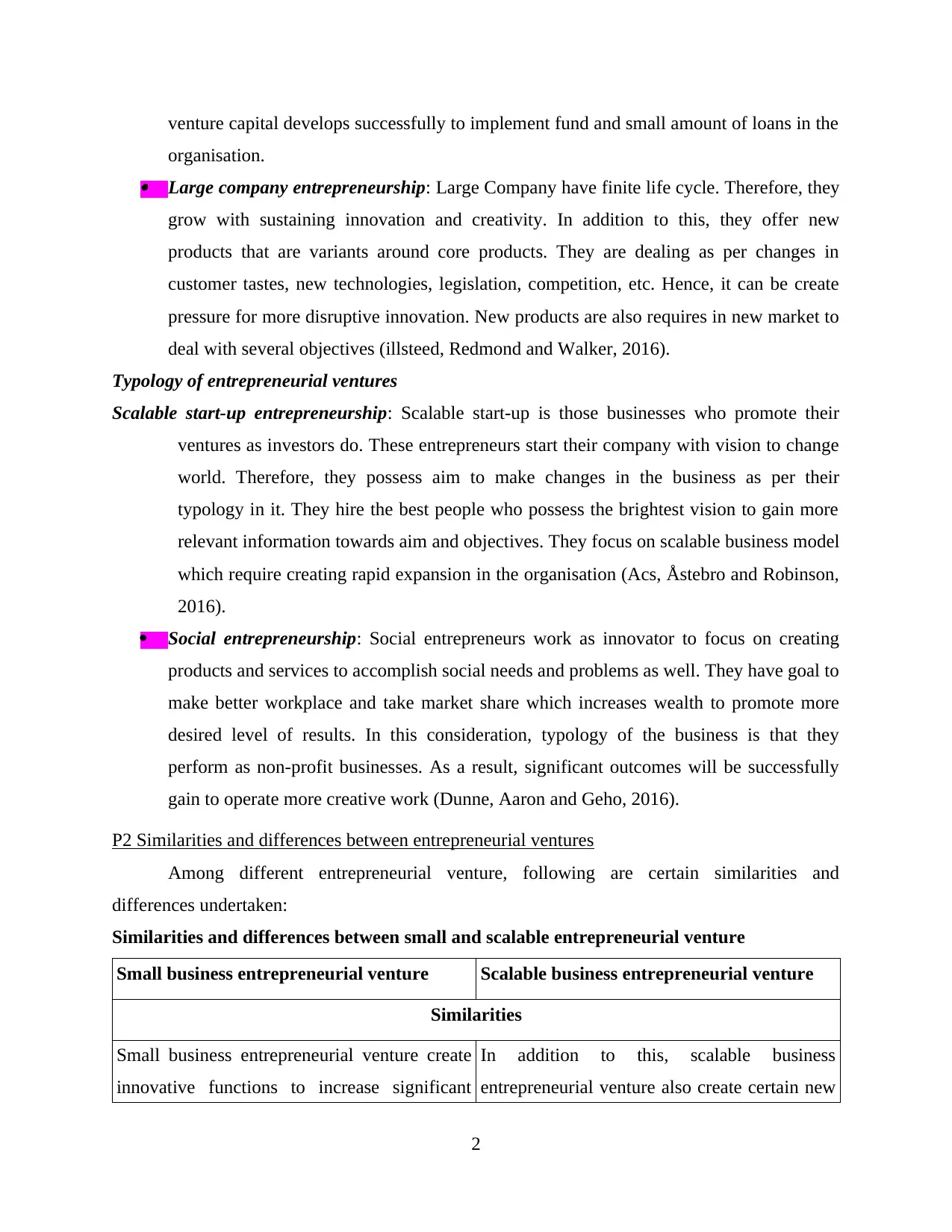
venture capital develops successfully to implement fund and small amount of loans in the
organisation. Large company entrepreneurship: Large Company have finite life cycle. Therefore, they
grow with sustaining innovation and creativity. In addition to this, they offer new
products that are variants around core products. They are dealing as per changes in
customer tastes, new technologies, legislation, competition, etc. Hence, it can be create
pressure for more disruptive innovation. New products are also requires in new market to
deal with several objectives (illsteed, Redmond and Walker, 2016).
Typology of entrepreneurial ventures
Scalable start-up entrepreneurship: Scalable start-up is those businesses who promote their
ventures as investors do. These entrepreneurs start their company with vision to change
world. Therefore, they possess aim to make changes in the business as per their
typology in it. They hire the best people who possess the brightest vision to gain more
relevant information towards aim and objectives. They focus on scalable business model
which require creating rapid expansion in the organisation (Acs, Åstebro and Robinson,
2016).
Social entrepreneurship: Social entrepreneurs work as innovator to focus on creating
products and services to accomplish social needs and problems as well. They have goal to
make better workplace and take market share which increases wealth to promote more
desired level of results. In this consideration, typology of the business is that they
perform as non-profit businesses. As a result, significant outcomes will be successfully
gain to operate more creative work (Dunne, Aaron and Geho, 2016).
P2 Similarities and differences between entrepreneurial ventures
Among different entrepreneurial venture, following are certain similarities and
differences undertaken:
Similarities and differences between small and scalable entrepreneurial venture
Small business entrepreneurial venture Scalable business entrepreneurial venture
Similarities
Small business entrepreneurial venture create
innovative functions to increase significant
In addition to this, scalable business
entrepreneurial venture also create certain new
2
organisation. Large company entrepreneurship: Large Company have finite life cycle. Therefore, they
grow with sustaining innovation and creativity. In addition to this, they offer new
products that are variants around core products. They are dealing as per changes in
customer tastes, new technologies, legislation, competition, etc. Hence, it can be create
pressure for more disruptive innovation. New products are also requires in new market to
deal with several objectives (illsteed, Redmond and Walker, 2016).
Typology of entrepreneurial ventures
Scalable start-up entrepreneurship: Scalable start-up is those businesses who promote their
ventures as investors do. These entrepreneurs start their company with vision to change
world. Therefore, they possess aim to make changes in the business as per their
typology in it. They hire the best people who possess the brightest vision to gain more
relevant information towards aim and objectives. They focus on scalable business model
which require creating rapid expansion in the organisation (Acs, Åstebro and Robinson,
2016).
Social entrepreneurship: Social entrepreneurs work as innovator to focus on creating
products and services to accomplish social needs and problems as well. They have goal to
make better workplace and take market share which increases wealth to promote more
desired level of results. In this consideration, typology of the business is that they
perform as non-profit businesses. As a result, significant outcomes will be successfully
gain to operate more creative work (Dunne, Aaron and Geho, 2016).
P2 Similarities and differences between entrepreneurial ventures
Among different entrepreneurial venture, following are certain similarities and
differences undertaken:
Similarities and differences between small and scalable entrepreneurial venture
Small business entrepreneurial venture Scalable business entrepreneurial venture
Similarities
Small business entrepreneurial venture create
innovative functions to increase significant
In addition to this, scalable business
entrepreneurial venture also create certain new
2
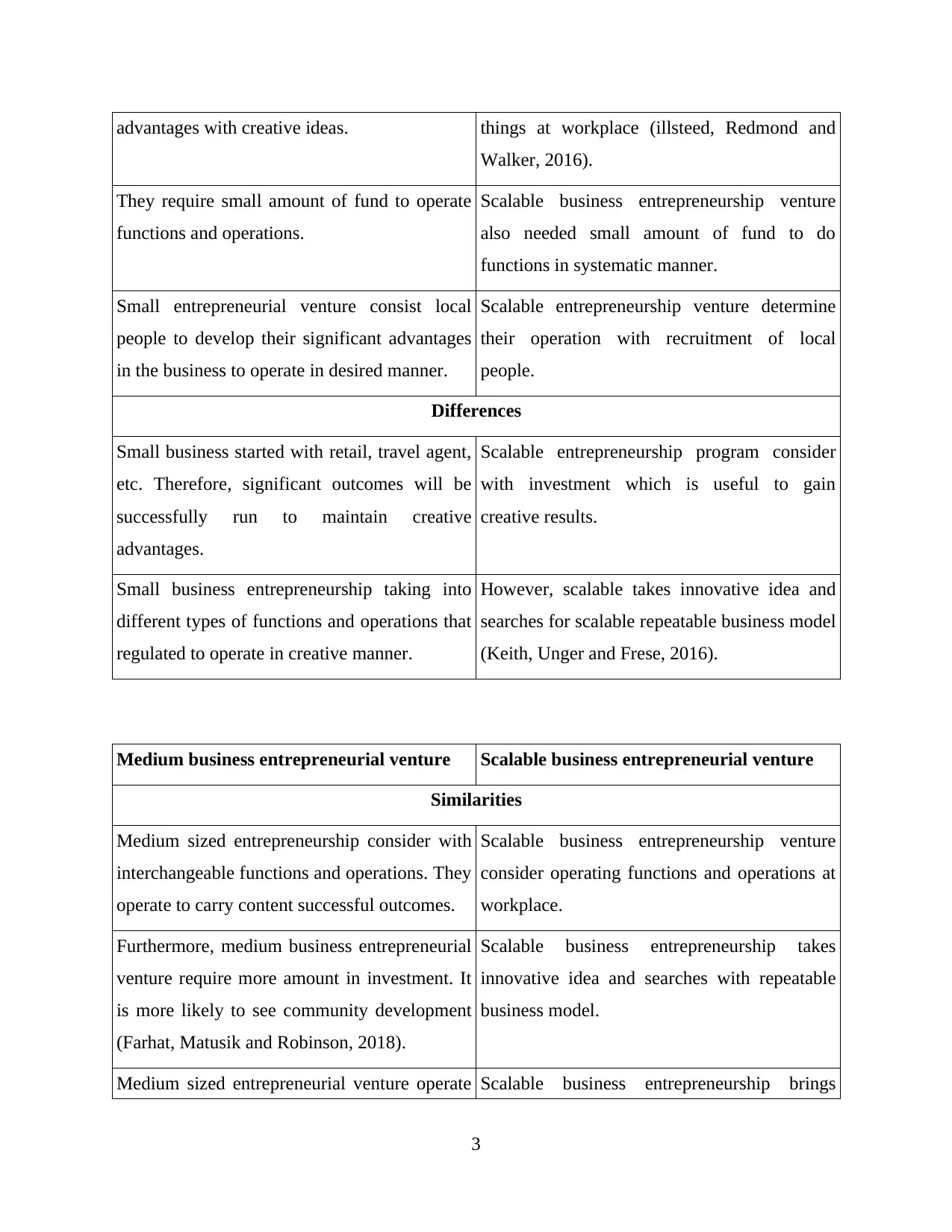
advantages with creative ideas. things at workplace (illsteed, Redmond and
Walker, 2016).
They require small amount of fund to operate
functions and operations.
Scalable business entrepreneurship venture
also needed small amount of fund to do
functions in systematic manner.
Small entrepreneurial venture consist local
people to develop their significant advantages
in the business to operate in desired manner.
Scalable entrepreneurship venture determine
their operation with recruitment of local
people.
Differences
Small business started with retail, travel agent,
etc. Therefore, significant outcomes will be
successfully run to maintain creative
advantages.
Scalable entrepreneurship program consider
with investment which is useful to gain
creative results.
Small business entrepreneurship taking into
different types of functions and operations that
regulated to operate in creative manner.
However, scalable takes innovative idea and
searches for scalable repeatable business model
(Keith, Unger and Frese, 2016).
Medium business entrepreneurial venture Scalable business entrepreneurial venture
Similarities
Medium sized entrepreneurship consider with
interchangeable functions and operations. They
operate to carry content successful outcomes.
Scalable business entrepreneurship venture
consider operating functions and operations at
workplace.
Furthermore, medium business entrepreneurial
venture require more amount in investment. It
is more likely to see community development
(Farhat, Matusik and Robinson, 2018).
Scalable business entrepreneurship takes
innovative idea and searches with repeatable
business model.
Medium sized entrepreneurial venture operate Scalable business entrepreneurship brings
3
Walker, 2016).
They require small amount of fund to operate
functions and operations.
Scalable business entrepreneurship venture
also needed small amount of fund to do
functions in systematic manner.
Small entrepreneurial venture consist local
people to develop their significant advantages
in the business to operate in desired manner.
Scalable entrepreneurship venture determine
their operation with recruitment of local
people.
Differences
Small business started with retail, travel agent,
etc. Therefore, significant outcomes will be
successfully run to maintain creative
advantages.
Scalable entrepreneurship program consider
with investment which is useful to gain
creative results.
Small business entrepreneurship taking into
different types of functions and operations that
regulated to operate in creative manner.
However, scalable takes innovative idea and
searches for scalable repeatable business model
(Keith, Unger and Frese, 2016).
Medium business entrepreneurial venture Scalable business entrepreneurial venture
Similarities
Medium sized entrepreneurship consider with
interchangeable functions and operations. They
operate to carry content successful outcomes.
Scalable business entrepreneurship venture
consider operating functions and operations at
workplace.
Furthermore, medium business entrepreneurial
venture require more amount in investment. It
is more likely to see community development
(Farhat, Matusik and Robinson, 2018).
Scalable business entrepreneurship takes
innovative idea and searches with repeatable
business model.
Medium sized entrepreneurial venture operate Scalable business entrepreneurship brings
3
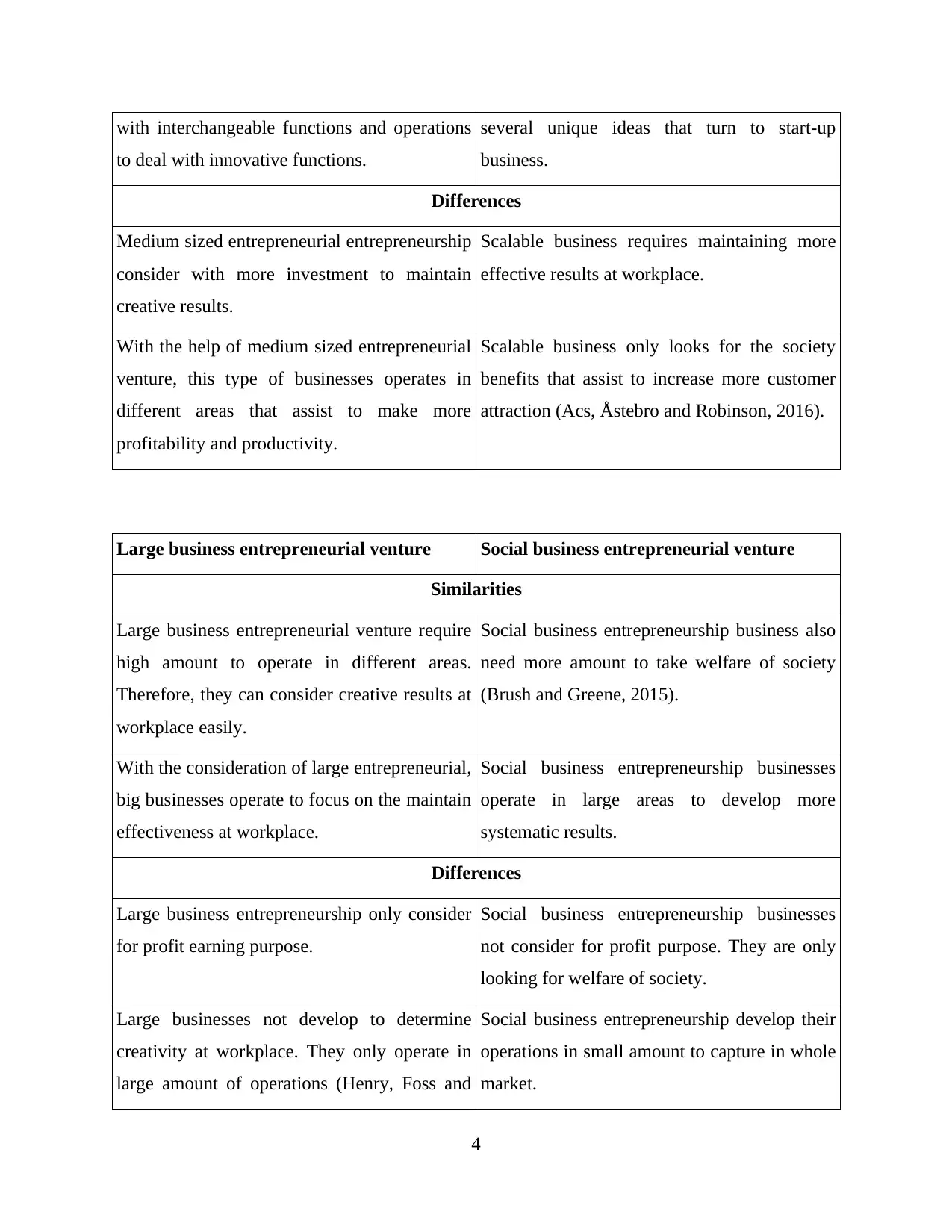
with interchangeable functions and operations
to deal with innovative functions.
several unique ideas that turn to start-up
business.
Differences
Medium sized entrepreneurial entrepreneurship
consider with more investment to maintain
creative results.
Scalable business requires maintaining more
effective results at workplace.
With the help of medium sized entrepreneurial
venture, this type of businesses operates in
different areas that assist to make more
profitability and productivity.
Scalable business only looks for the society
benefits that assist to increase more customer
attraction (Acs, Åstebro and Robinson, 2016).
Large business entrepreneurial venture Social business entrepreneurial venture
Similarities
Large business entrepreneurial venture require
high amount to operate in different areas.
Therefore, they can consider creative results at
workplace easily.
Social business entrepreneurship business also
need more amount to take welfare of society
(Brush and Greene, 2015).
With the consideration of large entrepreneurial,
big businesses operate to focus on the maintain
effectiveness at workplace.
Social business entrepreneurship businesses
operate in large areas to develop more
systematic results.
Differences
Large business entrepreneurship only consider
for profit earning purpose.
Social business entrepreneurship businesses
not consider for profit purpose. They are only
looking for welfare of society.
Large businesses not develop to determine
creativity at workplace. They only operate in
large amount of operations (Henry, Foss and
Social business entrepreneurship develop their
operations in small amount to capture in whole
market.
4
to deal with innovative functions.
several unique ideas that turn to start-up
business.
Differences
Medium sized entrepreneurial entrepreneurship
consider with more investment to maintain
creative results.
Scalable business requires maintaining more
effective results at workplace.
With the help of medium sized entrepreneurial
venture, this type of businesses operates in
different areas that assist to make more
profitability and productivity.
Scalable business only looks for the society
benefits that assist to increase more customer
attraction (Acs, Åstebro and Robinson, 2016).
Large business entrepreneurial venture Social business entrepreneurial venture
Similarities
Large business entrepreneurial venture require
high amount to operate in different areas.
Therefore, they can consider creative results at
workplace easily.
Social business entrepreneurship business also
need more amount to take welfare of society
(Brush and Greene, 2015).
With the consideration of large entrepreneurial,
big businesses operate to focus on the maintain
effectiveness at workplace.
Social business entrepreneurship businesses
operate in large areas to develop more
systematic results.
Differences
Large business entrepreneurship only consider
for profit earning purpose.
Social business entrepreneurship businesses
not consider for profit purpose. They are only
looking for welfare of society.
Large businesses not develop to determine
creativity at workplace. They only operate in
large amount of operations (Henry, Foss and
Social business entrepreneurship develop their
operations in small amount to capture in whole
market.
4
Paraphrase This Document
Need a fresh take? Get an instant paraphrase of this document with our AI Paraphraser
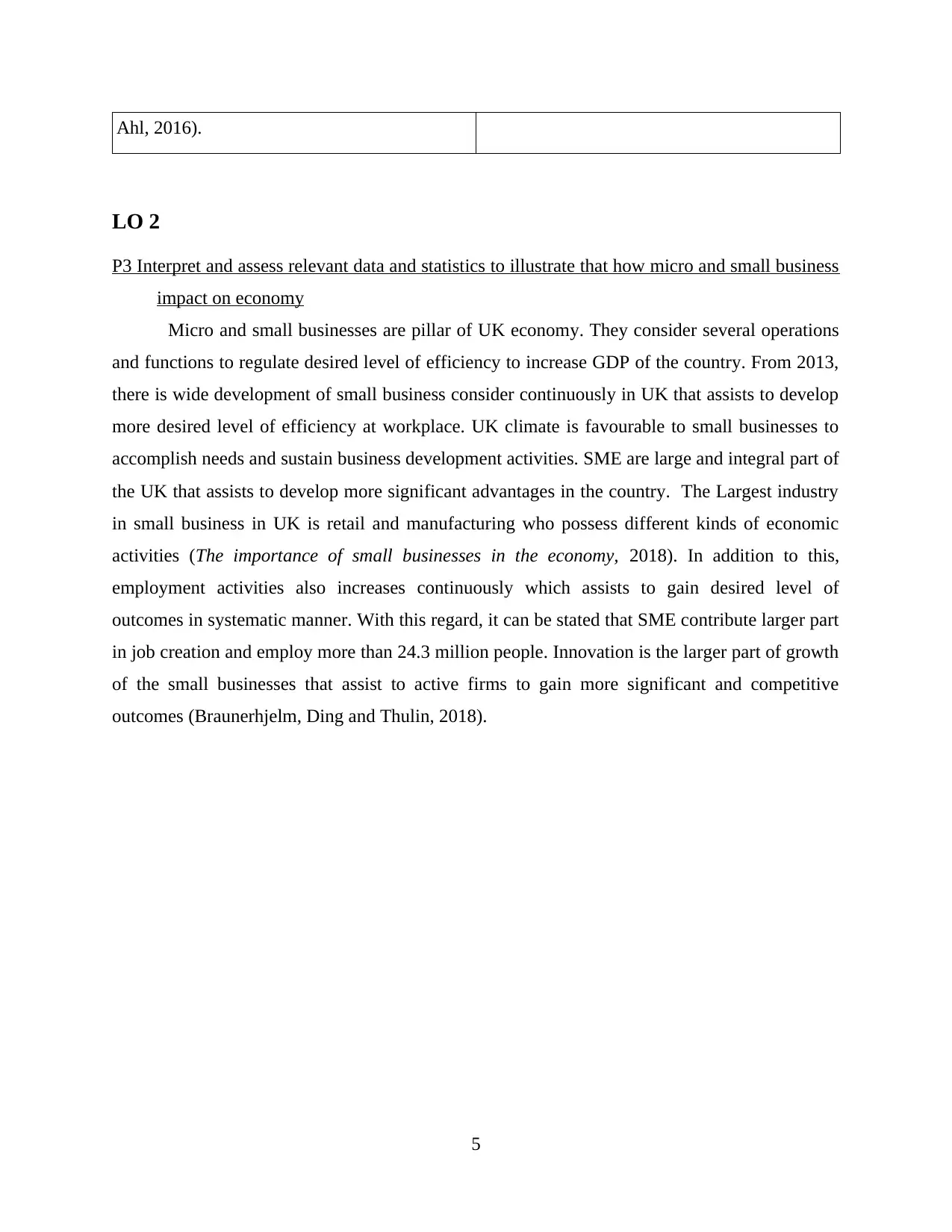
Ahl, 2016).
LO 2
P3 Interpret and assess relevant data and statistics to illustrate that how micro and small business
impact on economy
Micro and small businesses are pillar of UK economy. They consider several operations
and functions to regulate desired level of efficiency to increase GDP of the country. From 2013,
there is wide development of small business consider continuously in UK that assists to develop
more desired level of efficiency at workplace. UK climate is favourable to small businesses to
accomplish needs and sustain business development activities. SME are large and integral part of
the UK that assists to develop more significant advantages in the country. The Largest industry
in small business in UK is retail and manufacturing who possess different kinds of economic
activities (The importance of small businesses in the economy, 2018). In addition to this,
employment activities also increases continuously which assists to gain desired level of
outcomes in systematic manner. With this regard, it can be stated that SME contribute larger part
in job creation and employ more than 24.3 million people. Innovation is the larger part of growth
of the small businesses that assist to active firms to gain more significant and competitive
outcomes (Braunerhjelm, Ding and Thulin, 2018).
5
LO 2
P3 Interpret and assess relevant data and statistics to illustrate that how micro and small business
impact on economy
Micro and small businesses are pillar of UK economy. They consider several operations
and functions to regulate desired level of efficiency to increase GDP of the country. From 2013,
there is wide development of small business consider continuously in UK that assists to develop
more desired level of efficiency at workplace. UK climate is favourable to small businesses to
accomplish needs and sustain business development activities. SME are large and integral part of
the UK that assists to develop more significant advantages in the country. The Largest industry
in small business in UK is retail and manufacturing who possess different kinds of economic
activities (The importance of small businesses in the economy, 2018). In addition to this,
employment activities also increases continuously which assists to gain desired level of
outcomes in systematic manner. With this regard, it can be stated that SME contribute larger part
in job creation and employ more than 24.3 million people. Innovation is the larger part of growth
of the small businesses that assist to active firms to gain more significant and competitive
outcomes (Braunerhjelm, Ding and Thulin, 2018).
5
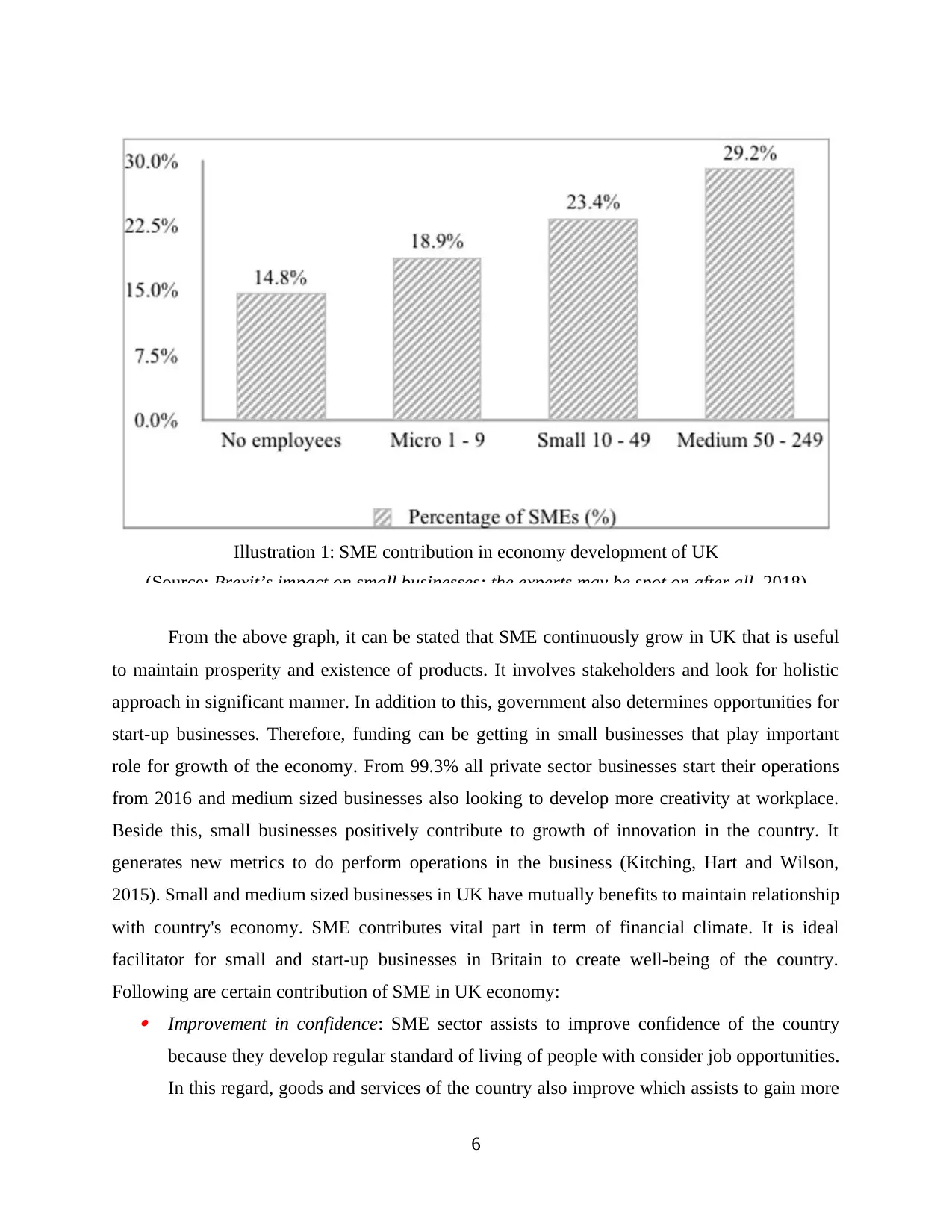
From the above graph, it can be stated that SME continuously grow in UK that is useful
to maintain prosperity and existence of products. It involves stakeholders and look for holistic
approach in significant manner. In addition to this, government also determines opportunities for
start-up businesses. Therefore, funding can be getting in small businesses that play important
role for growth of the economy. From 99.3% all private sector businesses start their operations
from 2016 and medium sized businesses also looking to develop more creativity at workplace.
Beside this, small businesses positively contribute to growth of innovation in the country. It
generates new metrics to do perform operations in the business (Kitching, Hart and Wilson,
2015). Small and medium sized businesses in UK have mutually benefits to maintain relationship
with country's economy. SME contributes vital part in term of financial climate. It is ideal
facilitator for small and start-up businesses in Britain to create well-being of the country.
Following are certain contribution of SME in UK economy: Improvement in confidence: SME sector assists to improve confidence of the country
because they develop regular standard of living of people with consider job opportunities.
In this regard, goods and services of the country also improve which assists to gain more
6
Illustration 1: SME contribution in economy development of UK
(Source: Brexit’s impact on small businesses: the experts may be spot on after all, 2018)
to maintain prosperity and existence of products. It involves stakeholders and look for holistic
approach in significant manner. In addition to this, government also determines opportunities for
start-up businesses. Therefore, funding can be getting in small businesses that play important
role for growth of the economy. From 99.3% all private sector businesses start their operations
from 2016 and medium sized businesses also looking to develop more creativity at workplace.
Beside this, small businesses positively contribute to growth of innovation in the country. It
generates new metrics to do perform operations in the business (Kitching, Hart and Wilson,
2015). Small and medium sized businesses in UK have mutually benefits to maintain relationship
with country's economy. SME contributes vital part in term of financial climate. It is ideal
facilitator for small and start-up businesses in Britain to create well-being of the country.
Following are certain contribution of SME in UK economy: Improvement in confidence: SME sector assists to improve confidence of the country
because they develop regular standard of living of people with consider job opportunities.
In this regard, goods and services of the country also improve which assists to gain more
6
Illustration 1: SME contribution in economy development of UK
(Source: Brexit’s impact on small businesses: the experts may be spot on after all, 2018)
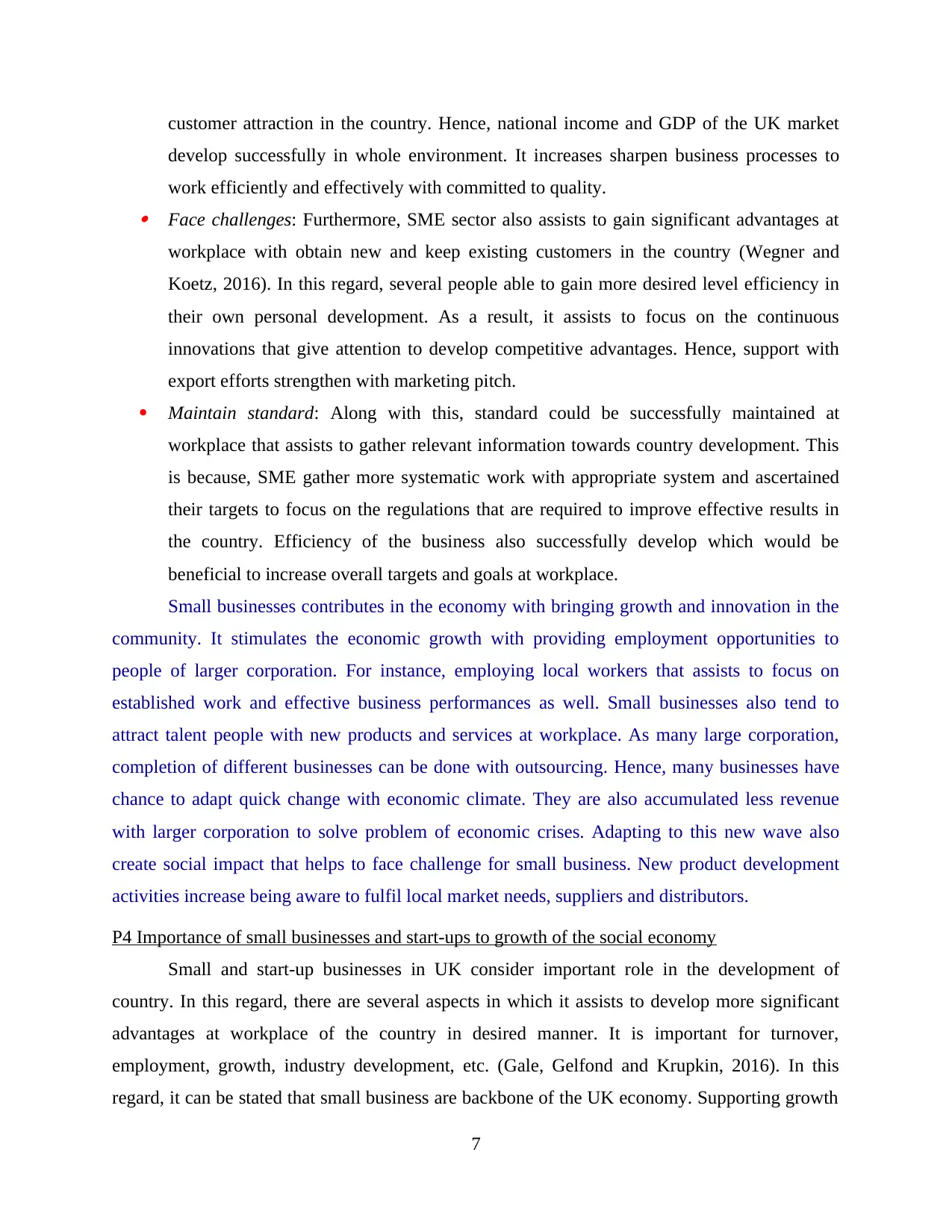
customer attraction in the country. Hence, national income and GDP of the UK market
develop successfully in whole environment. It increases sharpen business processes to
work efficiently and effectively with committed to quality. Face challenges: Furthermore, SME sector also assists to gain significant advantages at
workplace with obtain new and keep existing customers in the country (Wegner and
Koetz, 2016). In this regard, several people able to gain more desired level efficiency in
their own personal development. As a result, it assists to focus on the continuous
innovations that give attention to develop competitive advantages. Hence, support with
export efforts strengthen with marketing pitch.
Maintain standard: Along with this, standard could be successfully maintained at
workplace that assists to gather relevant information towards country development. This
is because, SME gather more systematic work with appropriate system and ascertained
their targets to focus on the regulations that are required to improve effective results in
the country. Efficiency of the business also successfully develop which would be
beneficial to increase overall targets and goals at workplace.
Small businesses contributes in the economy with bringing growth and innovation in the
community. It stimulates the economic growth with providing employment opportunities to
people of larger corporation. For instance, employing local workers that assists to focus on
established work and effective business performances as well. Small businesses also tend to
attract talent people with new products and services at workplace. As many large corporation,
completion of different businesses can be done with outsourcing. Hence, many businesses have
chance to adapt quick change with economic climate. They are also accumulated less revenue
with larger corporation to solve problem of economic crises. Adapting to this new wave also
create social impact that helps to face challenge for small business. New product development
activities increase being aware to fulfil local market needs, suppliers and distributors.
P4 Importance of small businesses and start-ups to growth of the social economy
Small and start-up businesses in UK consider important role in the development of
country. In this regard, there are several aspects in which it assists to develop more significant
advantages at workplace of the country in desired manner. It is important for turnover,
employment, growth, industry development, etc. (Gale, Gelfond and Krupkin, 2016). In this
regard, it can be stated that small business are backbone of the UK economy. Supporting growth
7
develop successfully in whole environment. It increases sharpen business processes to
work efficiently and effectively with committed to quality. Face challenges: Furthermore, SME sector also assists to gain significant advantages at
workplace with obtain new and keep existing customers in the country (Wegner and
Koetz, 2016). In this regard, several people able to gain more desired level efficiency in
their own personal development. As a result, it assists to focus on the continuous
innovations that give attention to develop competitive advantages. Hence, support with
export efforts strengthen with marketing pitch.
Maintain standard: Along with this, standard could be successfully maintained at
workplace that assists to gather relevant information towards country development. This
is because, SME gather more systematic work with appropriate system and ascertained
their targets to focus on the regulations that are required to improve effective results in
the country. Efficiency of the business also successfully develop which would be
beneficial to increase overall targets and goals at workplace.
Small businesses contributes in the economy with bringing growth and innovation in the
community. It stimulates the economic growth with providing employment opportunities to
people of larger corporation. For instance, employing local workers that assists to focus on
established work and effective business performances as well. Small businesses also tend to
attract talent people with new products and services at workplace. As many large corporation,
completion of different businesses can be done with outsourcing. Hence, many businesses have
chance to adapt quick change with economic climate. They are also accumulated less revenue
with larger corporation to solve problem of economic crises. Adapting to this new wave also
create social impact that helps to face challenge for small business. New product development
activities increase being aware to fulfil local market needs, suppliers and distributors.
P4 Importance of small businesses and start-ups to growth of the social economy
Small and start-up businesses in UK consider important role in the development of
country. In this regard, there are several aspects in which it assists to develop more significant
advantages at workplace of the country in desired manner. It is important for turnover,
employment, growth, industry development, etc. (Gale, Gelfond and Krupkin, 2016). In this
regard, it can be stated that small business are backbone of the UK economy. Supporting growth
7
Secure Best Marks with AI Grader
Need help grading? Try our AI Grader for instant feedback on your assignments.
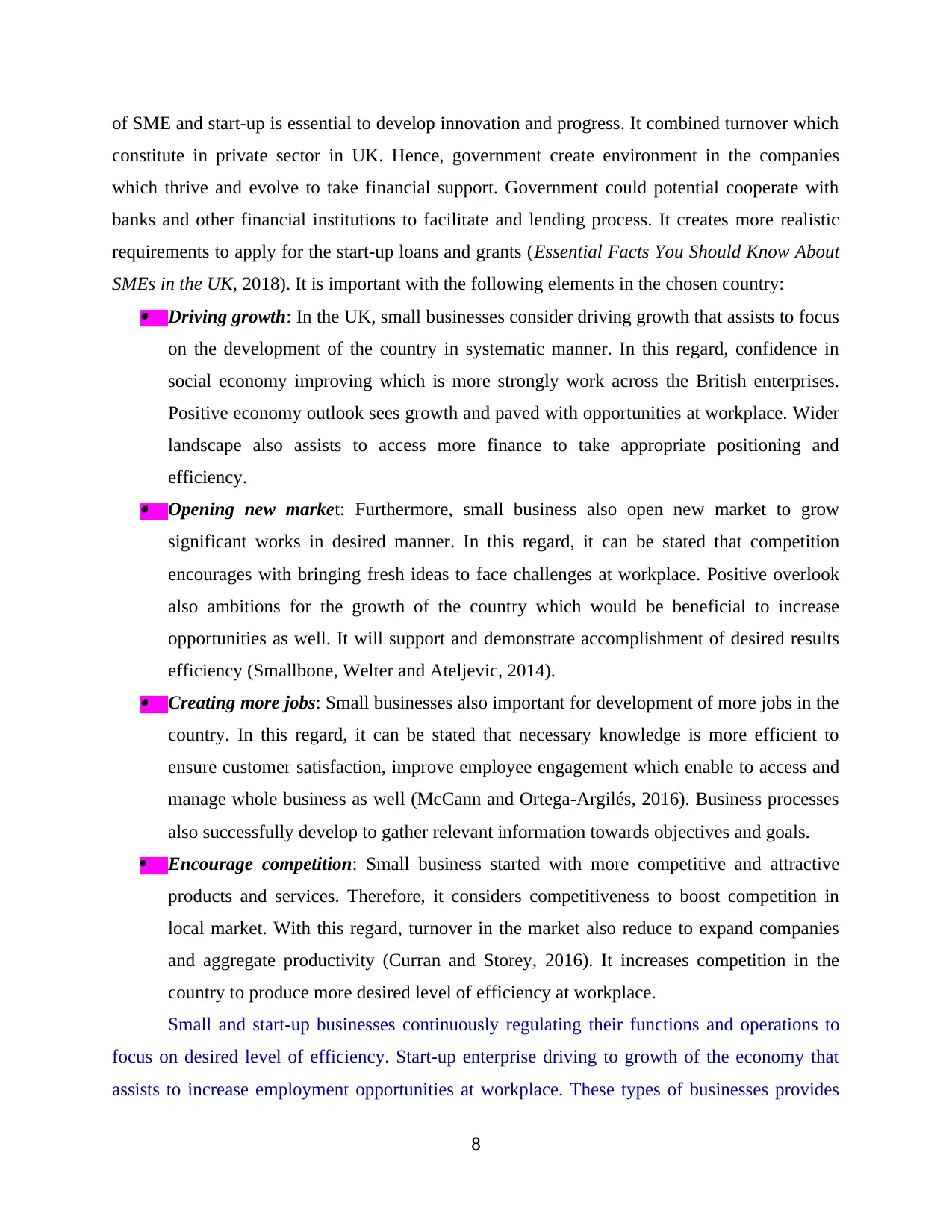
of SME and start-up is essential to develop innovation and progress. It combined turnover which
constitute in private sector in UK. Hence, government create environment in the companies
which thrive and evolve to take financial support. Government could potential cooperate with
banks and other financial institutions to facilitate and lending process. It creates more realistic
requirements to apply for the start-up loans and grants (Essential Facts You Should Know About
SMEs in the UK, 2018). It is important with the following elements in the chosen country: Driving growth: In the UK, small businesses consider driving growth that assists to focus
on the development of the country in systematic manner. In this regard, confidence in
social economy improving which is more strongly work across the British enterprises.
Positive economy outlook sees growth and paved with opportunities at workplace. Wider
landscape also assists to access more finance to take appropriate positioning and
efficiency. Opening new market: Furthermore, small business also open new market to grow
significant works in desired manner. In this regard, it can be stated that competition
encourages with bringing fresh ideas to face challenges at workplace. Positive overlook
also ambitions for the growth of the country which would be beneficial to increase
opportunities as well. It will support and demonstrate accomplishment of desired results
efficiency (Smallbone, Welter and Ateljevic, 2014). Creating more jobs: Small businesses also important for development of more jobs in the
country. In this regard, it can be stated that necessary knowledge is more efficient to
ensure customer satisfaction, improve employee engagement which enable to access and
manage whole business as well (McCann and Ortega-Argilés, 2016). Business processes
also successfully develop to gather relevant information towards objectives and goals.
Encourage competition: Small business started with more competitive and attractive
products and services. Therefore, it considers competitiveness to boost competition in
local market. With this regard, turnover in the market also reduce to expand companies
and aggregate productivity (Curran and Storey, 2016). It increases competition in the
country to produce more desired level of efficiency at workplace.
Small and start-up businesses continuously regulating their functions and operations to
focus on desired level of efficiency. Start-up enterprise driving to growth of the economy that
assists to increase employment opportunities at workplace. These types of businesses provides
8
constitute in private sector in UK. Hence, government create environment in the companies
which thrive and evolve to take financial support. Government could potential cooperate with
banks and other financial institutions to facilitate and lending process. It creates more realistic
requirements to apply for the start-up loans and grants (Essential Facts You Should Know About
SMEs in the UK, 2018). It is important with the following elements in the chosen country: Driving growth: In the UK, small businesses consider driving growth that assists to focus
on the development of the country in systematic manner. In this regard, confidence in
social economy improving which is more strongly work across the British enterprises.
Positive economy outlook sees growth and paved with opportunities at workplace. Wider
landscape also assists to access more finance to take appropriate positioning and
efficiency. Opening new market: Furthermore, small business also open new market to grow
significant works in desired manner. In this regard, it can be stated that competition
encourages with bringing fresh ideas to face challenges at workplace. Positive overlook
also ambitions for the growth of the country which would be beneficial to increase
opportunities as well. It will support and demonstrate accomplishment of desired results
efficiency (Smallbone, Welter and Ateljevic, 2014). Creating more jobs: Small businesses also important for development of more jobs in the
country. In this regard, it can be stated that necessary knowledge is more efficient to
ensure customer satisfaction, improve employee engagement which enable to access and
manage whole business as well (McCann and Ortega-Argilés, 2016). Business processes
also successfully develop to gather relevant information towards objectives and goals.
Encourage competition: Small business started with more competitive and attractive
products and services. Therefore, it considers competitiveness to boost competition in
local market. With this regard, turnover in the market also reduce to expand companies
and aggregate productivity (Curran and Storey, 2016). It increases competition in the
country to produce more desired level of efficiency at workplace.
Small and start-up businesses continuously regulating their functions and operations to
focus on desired level of efficiency. Start-up enterprise driving to growth of the economy that
assists to increase employment opportunities at workplace. These types of businesses provides
8
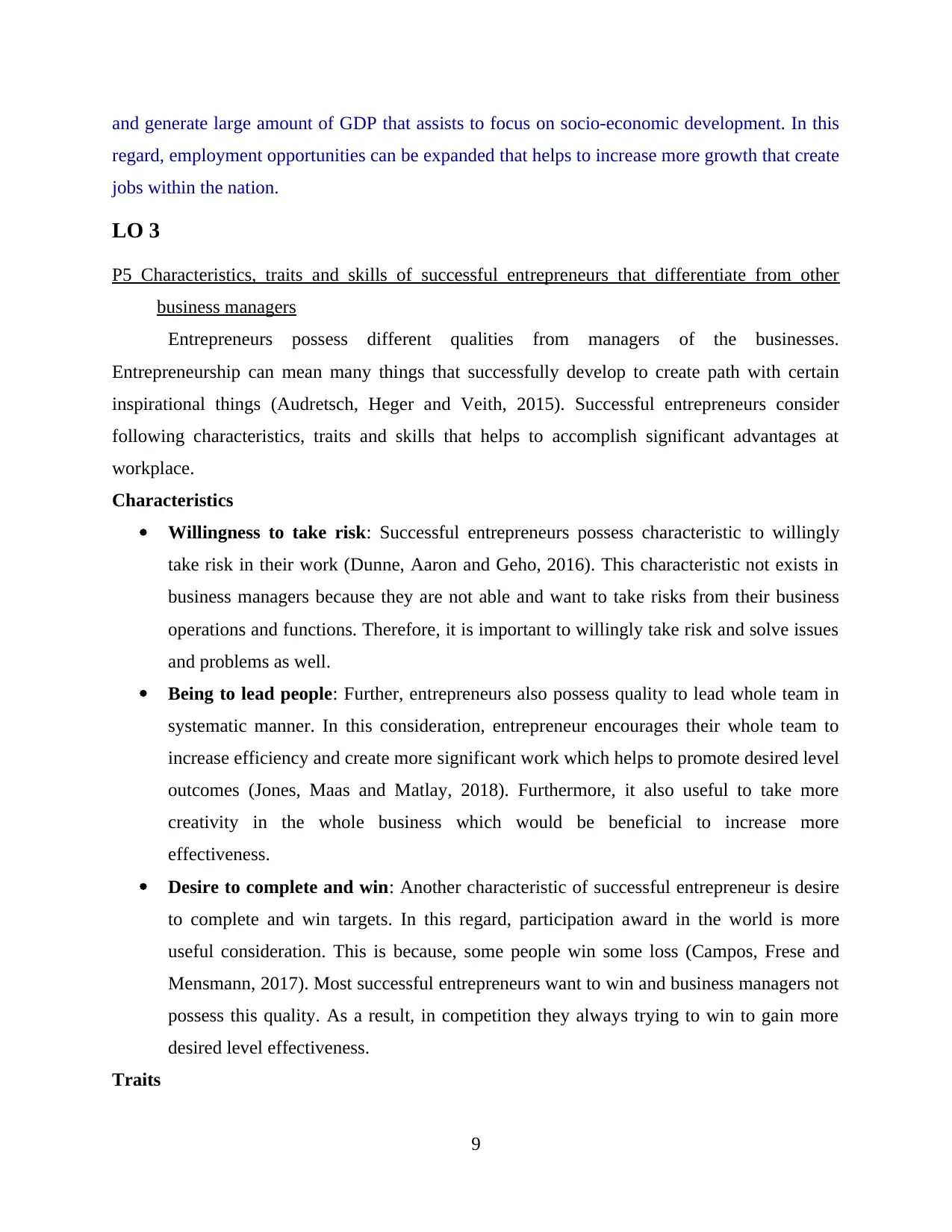
and generate large amount of GDP that assists to focus on socio-economic development. In this
regard, employment opportunities can be expanded that helps to increase more growth that create
jobs within the nation.
LO 3
P5 Characteristics, traits and skills of successful entrepreneurs that differentiate from other
business managers
Entrepreneurs possess different qualities from managers of the businesses.
Entrepreneurship can mean many things that successfully develop to create path with certain
inspirational things (Audretsch, Heger and Veith, 2015). Successful entrepreneurs consider
following characteristics, traits and skills that helps to accomplish significant advantages at
workplace.
Characteristics
Willingness to take risk: Successful entrepreneurs possess characteristic to willingly
take risk in their work (Dunne, Aaron and Geho, 2016). This characteristic not exists in
business managers because they are not able and want to take risks from their business
operations and functions. Therefore, it is important to willingly take risk and solve issues
and problems as well.
Being to lead people: Further, entrepreneurs also possess quality to lead whole team in
systematic manner. In this consideration, entrepreneur encourages their whole team to
increase efficiency and create more significant work which helps to promote desired level
outcomes (Jones, Maas and Matlay, 2018). Furthermore, it also useful to take more
creativity in the whole business which would be beneficial to increase more
effectiveness.
Desire to complete and win: Another characteristic of successful entrepreneur is desire
to complete and win targets. In this regard, participation award in the world is more
useful consideration. This is because, some people win some loss (Campos, Frese and
Mensmann, 2017). Most successful entrepreneurs want to win and business managers not
possess this quality. As a result, in competition they always trying to win to gain more
desired level effectiveness.
Traits
9
regard, employment opportunities can be expanded that helps to increase more growth that create
jobs within the nation.
LO 3
P5 Characteristics, traits and skills of successful entrepreneurs that differentiate from other
business managers
Entrepreneurs possess different qualities from managers of the businesses.
Entrepreneurship can mean many things that successfully develop to create path with certain
inspirational things (Audretsch, Heger and Veith, 2015). Successful entrepreneurs consider
following characteristics, traits and skills that helps to accomplish significant advantages at
workplace.
Characteristics
Willingness to take risk: Successful entrepreneurs possess characteristic to willingly
take risk in their work (Dunne, Aaron and Geho, 2016). This characteristic not exists in
business managers because they are not able and want to take risks from their business
operations and functions. Therefore, it is important to willingly take risk and solve issues
and problems as well.
Being to lead people: Further, entrepreneurs also possess quality to lead whole team in
systematic manner. In this consideration, entrepreneur encourages their whole team to
increase efficiency and create more significant work which helps to promote desired level
outcomes (Jones, Maas and Matlay, 2018). Furthermore, it also useful to take more
creativity in the whole business which would be beneficial to increase more
effectiveness.
Desire to complete and win: Another characteristic of successful entrepreneur is desire
to complete and win targets. In this regard, participation award in the world is more
useful consideration. This is because, some people win some loss (Campos, Frese and
Mensmann, 2017). Most successful entrepreneurs want to win and business managers not
possess this quality. As a result, in competition they always trying to win to gain more
desired level effectiveness.
Traits
9
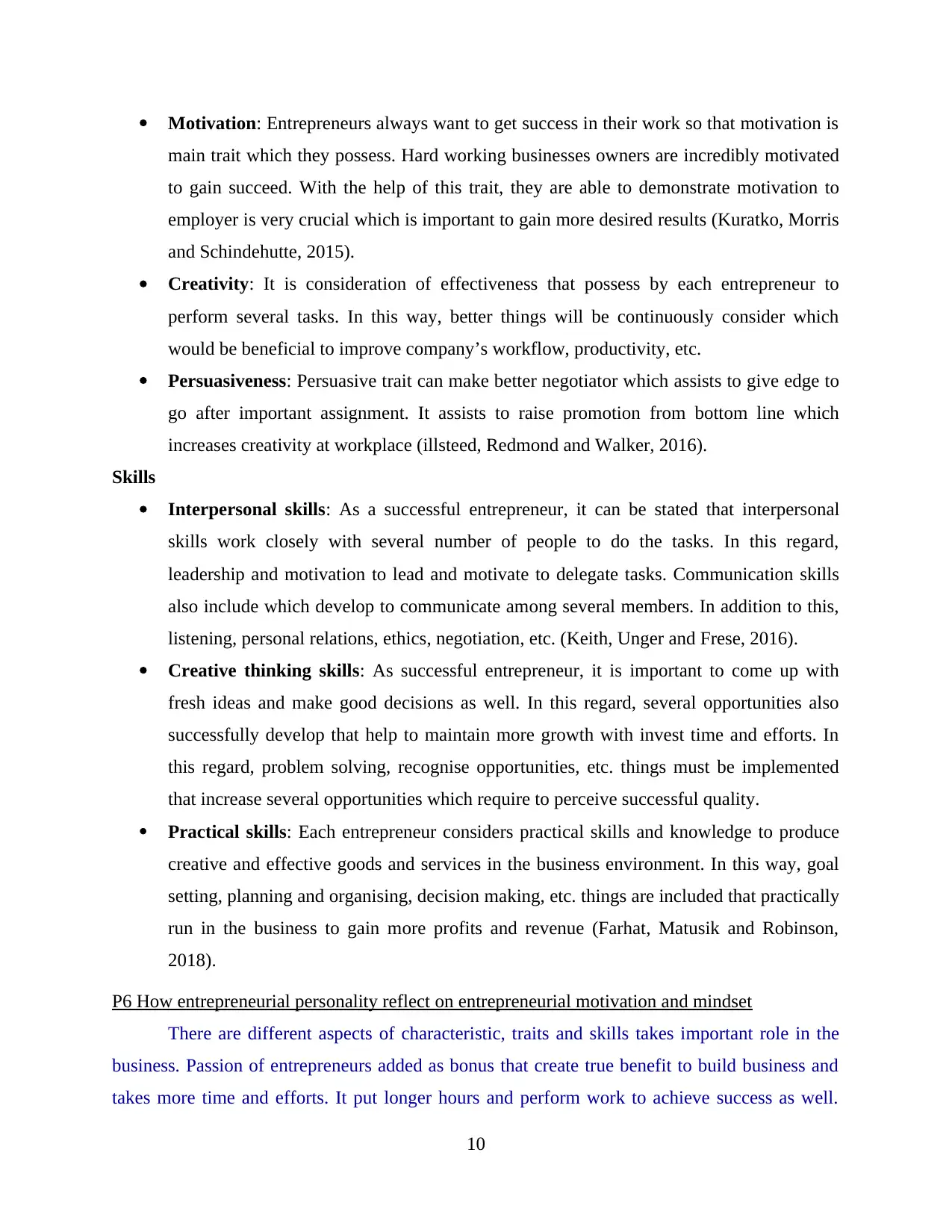
Motivation: Entrepreneurs always want to get success in their work so that motivation is
main trait which they possess. Hard working businesses owners are incredibly motivated
to gain succeed. With the help of this trait, they are able to demonstrate motivation to
employer is very crucial which is important to gain more desired results (Kuratko, Morris
and Schindehutte, 2015).
Creativity: It is consideration of effectiveness that possess by each entrepreneur to
perform several tasks. In this way, better things will be continuously consider which
would be beneficial to improve company’s workflow, productivity, etc.
Persuasiveness: Persuasive trait can make better negotiator which assists to give edge to
go after important assignment. It assists to raise promotion from bottom line which
increases creativity at workplace (illsteed, Redmond and Walker, 2016).
Skills
Interpersonal skills: As a successful entrepreneur, it can be stated that interpersonal
skills work closely with several number of people to do the tasks. In this regard,
leadership and motivation to lead and motivate to delegate tasks. Communication skills
also include which develop to communicate among several members. In addition to this,
listening, personal relations, ethics, negotiation, etc. (Keith, Unger and Frese, 2016).
Creative thinking skills: As successful entrepreneur, it is important to come up with
fresh ideas and make good decisions as well. In this regard, several opportunities also
successfully develop that help to maintain more growth with invest time and efforts. In
this regard, problem solving, recognise opportunities, etc. things must be implemented
that increase several opportunities which require to perceive successful quality.
Practical skills: Each entrepreneur considers practical skills and knowledge to produce
creative and effective goods and services in the business environment. In this way, goal
setting, planning and organising, decision making, etc. things are included that practically
run in the business to gain more profits and revenue (Farhat, Matusik and Robinson,
2018).
P6 How entrepreneurial personality reflect on entrepreneurial motivation and mindset
There are different aspects of characteristic, traits and skills takes important role in the
business. Passion of entrepreneurs added as bonus that create true benefit to build business and
takes more time and efforts. It put longer hours and perform work to achieve success as well.
10
main trait which they possess. Hard working businesses owners are incredibly motivated
to gain succeed. With the help of this trait, they are able to demonstrate motivation to
employer is very crucial which is important to gain more desired results (Kuratko, Morris
and Schindehutte, 2015).
Creativity: It is consideration of effectiveness that possess by each entrepreneur to
perform several tasks. In this way, better things will be continuously consider which
would be beneficial to improve company’s workflow, productivity, etc.
Persuasiveness: Persuasive trait can make better negotiator which assists to give edge to
go after important assignment. It assists to raise promotion from bottom line which
increases creativity at workplace (illsteed, Redmond and Walker, 2016).
Skills
Interpersonal skills: As a successful entrepreneur, it can be stated that interpersonal
skills work closely with several number of people to do the tasks. In this regard,
leadership and motivation to lead and motivate to delegate tasks. Communication skills
also include which develop to communicate among several members. In addition to this,
listening, personal relations, ethics, negotiation, etc. (Keith, Unger and Frese, 2016).
Creative thinking skills: As successful entrepreneur, it is important to come up with
fresh ideas and make good decisions as well. In this regard, several opportunities also
successfully develop that help to maintain more growth with invest time and efforts. In
this regard, problem solving, recognise opportunities, etc. things must be implemented
that increase several opportunities which require to perceive successful quality.
Practical skills: Each entrepreneur considers practical skills and knowledge to produce
creative and effective goods and services in the business environment. In this way, goal
setting, planning and organising, decision making, etc. things are included that practically
run in the business to gain more profits and revenue (Farhat, Matusik and Robinson,
2018).
P6 How entrepreneurial personality reflect on entrepreneurial motivation and mindset
There are different aspects of characteristic, traits and skills takes important role in the
business. Passion of entrepreneurs added as bonus that create true benefit to build business and
takes more time and efforts. It put longer hours and perform work to achieve success as well.
10
Paraphrase This Document
Need a fresh take? Get an instant paraphrase of this document with our AI Paraphraser
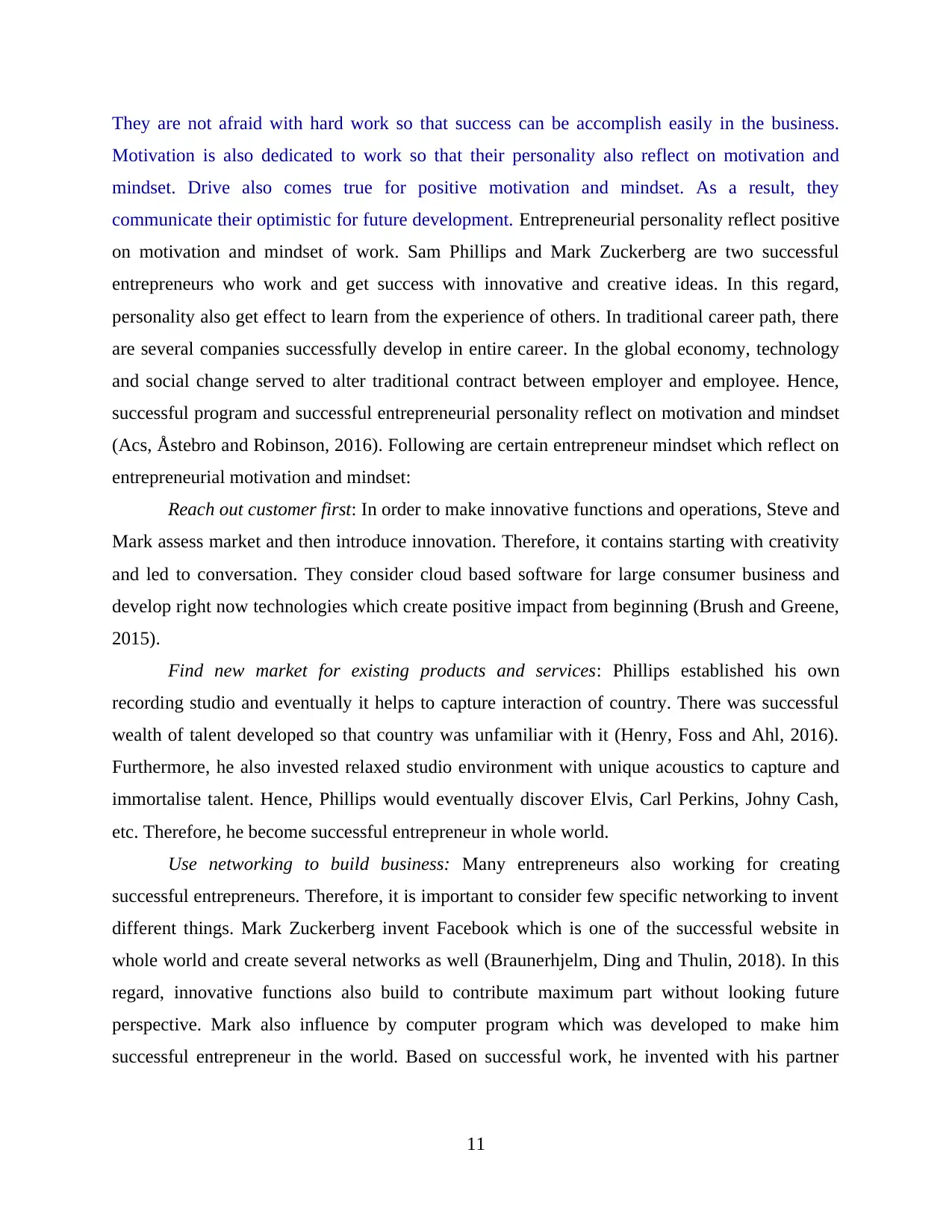
They are not afraid with hard work so that success can be accomplish easily in the business.
Motivation is also dedicated to work so that their personality also reflect on motivation and
mindset. Drive also comes true for positive motivation and mindset. As a result, they
communicate their optimistic for future development. Entrepreneurial personality reflect positive
on motivation and mindset of work. Sam Phillips and Mark Zuckerberg are two successful
entrepreneurs who work and get success with innovative and creative ideas. In this regard,
personality also get effect to learn from the experience of others. In traditional career path, there
are several companies successfully develop in entire career. In the global economy, technology
and social change served to alter traditional contract between employer and employee. Hence,
successful program and successful entrepreneurial personality reflect on motivation and mindset
(Acs, Åstebro and Robinson, 2016). Following are certain entrepreneur mindset which reflect on
entrepreneurial motivation and mindset:
Reach out customer first: In order to make innovative functions and operations, Steve and
Mark assess market and then introduce innovation. Therefore, it contains starting with creativity
and led to conversation. They consider cloud based software for large consumer business and
develop right now technologies which create positive impact from beginning (Brush and Greene,
2015).
Find new market for existing products and services: Phillips established his own
recording studio and eventually it helps to capture interaction of country. There was successful
wealth of talent developed so that country was unfamiliar with it (Henry, Foss and Ahl, 2016).
Furthermore, he also invested relaxed studio environment with unique acoustics to capture and
immortalise talent. Hence, Phillips would eventually discover Elvis, Carl Perkins, Johny Cash,
etc. Therefore, he become successful entrepreneur in whole world.
Use networking to build business: Many entrepreneurs also working for creating
successful entrepreneurs. Therefore, it is important to consider few specific networking to invent
different things. Mark Zuckerberg invent Facebook which is one of the successful website in
whole world and create several networks as well (Braunerhjelm, Ding and Thulin, 2018). In this
regard, innovative functions also build to contribute maximum part without looking future
perspective. Mark also influence by computer program which was developed to make him
successful entrepreneur in the world. Based on successful work, he invented with his partner
11
Motivation is also dedicated to work so that their personality also reflect on motivation and
mindset. Drive also comes true for positive motivation and mindset. As a result, they
communicate their optimistic for future development. Entrepreneurial personality reflect positive
on motivation and mindset of work. Sam Phillips and Mark Zuckerberg are two successful
entrepreneurs who work and get success with innovative and creative ideas. In this regard,
personality also get effect to learn from the experience of others. In traditional career path, there
are several companies successfully develop in entire career. In the global economy, technology
and social change served to alter traditional contract between employer and employee. Hence,
successful program and successful entrepreneurial personality reflect on motivation and mindset
(Acs, Åstebro and Robinson, 2016). Following are certain entrepreneur mindset which reflect on
entrepreneurial motivation and mindset:
Reach out customer first: In order to make innovative functions and operations, Steve and
Mark assess market and then introduce innovation. Therefore, it contains starting with creativity
and led to conversation. They consider cloud based software for large consumer business and
develop right now technologies which create positive impact from beginning (Brush and Greene,
2015).
Find new market for existing products and services: Phillips established his own
recording studio and eventually it helps to capture interaction of country. There was successful
wealth of talent developed so that country was unfamiliar with it (Henry, Foss and Ahl, 2016).
Furthermore, he also invested relaxed studio environment with unique acoustics to capture and
immortalise talent. Hence, Phillips would eventually discover Elvis, Carl Perkins, Johny Cash,
etc. Therefore, he become successful entrepreneur in whole world.
Use networking to build business: Many entrepreneurs also working for creating
successful entrepreneurs. Therefore, it is important to consider few specific networking to invent
different things. Mark Zuckerberg invent Facebook which is one of the successful website in
whole world and create several networks as well (Braunerhjelm, Ding and Thulin, 2018). In this
regard, innovative functions also build to contribute maximum part without looking future
perspective. Mark also influence by computer program which was developed to make him
successful entrepreneur in the world. Based on successful work, he invented with his partner
11
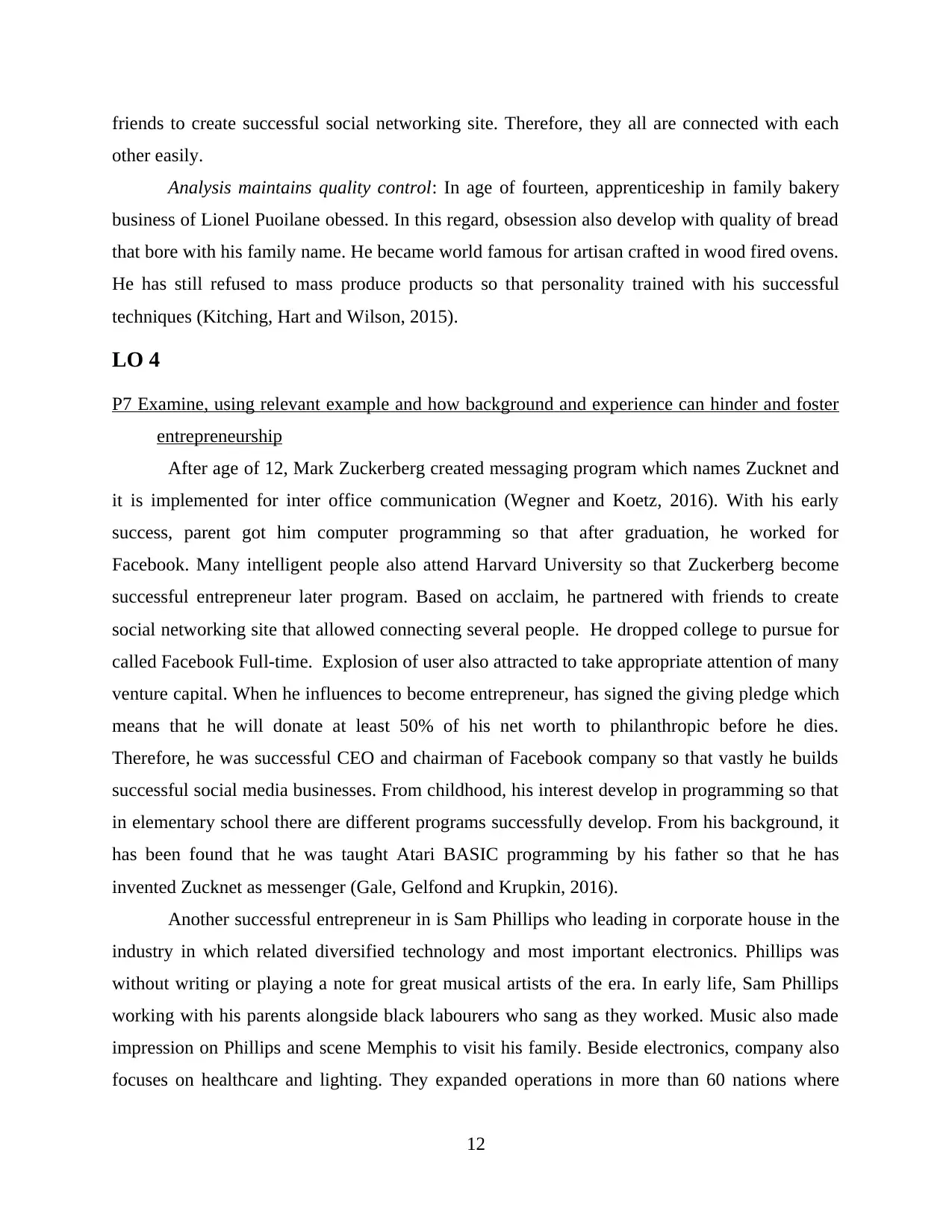
friends to create successful social networking site. Therefore, they all are connected with each
other easily.
Analysis maintains quality control: In age of fourteen, apprenticeship in family bakery
business of Lionel Puoilane obessed. In this regard, obsession also develop with quality of bread
that bore with his family name. He became world famous for artisan crafted in wood fired ovens.
He has still refused to mass produce products so that personality trained with his successful
techniques (Kitching, Hart and Wilson, 2015).
LO 4
P7 Examine, using relevant example and how background and experience can hinder and foster
entrepreneurship
After age of 12, Mark Zuckerberg created messaging program which names Zucknet and
it is implemented for inter office communication (Wegner and Koetz, 2016). With his early
success, parent got him computer programming so that after graduation, he worked for
Facebook. Many intelligent people also attend Harvard University so that Zuckerberg become
successful entrepreneur later program. Based on acclaim, he partnered with friends to create
social networking site that allowed connecting several people. He dropped college to pursue for
called Facebook Full-time. Explosion of user also attracted to take appropriate attention of many
venture capital. When he influences to become entrepreneur, has signed the giving pledge which
means that he will donate at least 50% of his net worth to philanthropic before he dies.
Therefore, he was successful CEO and chairman of Facebook company so that vastly he builds
successful social media businesses. From childhood, his interest develop in programming so that
in elementary school there are different programs successfully develop. From his background, it
has been found that he was taught Atari BASIC programming by his father so that he has
invented Zucknet as messenger (Gale, Gelfond and Krupkin, 2016).
Another successful entrepreneur in is Sam Phillips who leading in corporate house in the
industry in which related diversified technology and most important electronics. Phillips was
without writing or playing a note for great musical artists of the era. In early life, Sam Phillips
working with his parents alongside black labourers who sang as they worked. Music also made
impression on Phillips and scene Memphis to visit his family. Beside electronics, company also
focuses on healthcare and lighting. They expanded operations in more than 60 nations where
12
other easily.
Analysis maintains quality control: In age of fourteen, apprenticeship in family bakery
business of Lionel Puoilane obessed. In this regard, obsession also develop with quality of bread
that bore with his family name. He became world famous for artisan crafted in wood fired ovens.
He has still refused to mass produce products so that personality trained with his successful
techniques (Kitching, Hart and Wilson, 2015).
LO 4
P7 Examine, using relevant example and how background and experience can hinder and foster
entrepreneurship
After age of 12, Mark Zuckerberg created messaging program which names Zucknet and
it is implemented for inter office communication (Wegner and Koetz, 2016). With his early
success, parent got him computer programming so that after graduation, he worked for
Facebook. Many intelligent people also attend Harvard University so that Zuckerberg become
successful entrepreneur later program. Based on acclaim, he partnered with friends to create
social networking site that allowed connecting several people. He dropped college to pursue for
called Facebook Full-time. Explosion of user also attracted to take appropriate attention of many
venture capital. When he influences to become entrepreneur, has signed the giving pledge which
means that he will donate at least 50% of his net worth to philanthropic before he dies.
Therefore, he was successful CEO and chairman of Facebook company so that vastly he builds
successful social media businesses. From childhood, his interest develop in programming so that
in elementary school there are different programs successfully develop. From his background, it
has been found that he was taught Atari BASIC programming by his father so that he has
invented Zucknet as messenger (Gale, Gelfond and Krupkin, 2016).
Another successful entrepreneur in is Sam Phillips who leading in corporate house in the
industry in which related diversified technology and most important electronics. Phillips was
without writing or playing a note for great musical artists of the era. In early life, Sam Phillips
working with his parents alongside black labourers who sang as they worked. Music also made
impression on Phillips and scene Memphis to visit his family. Beside electronics, company also
focuses on healthcare and lighting. They expanded operations in more than 60 nations where
12
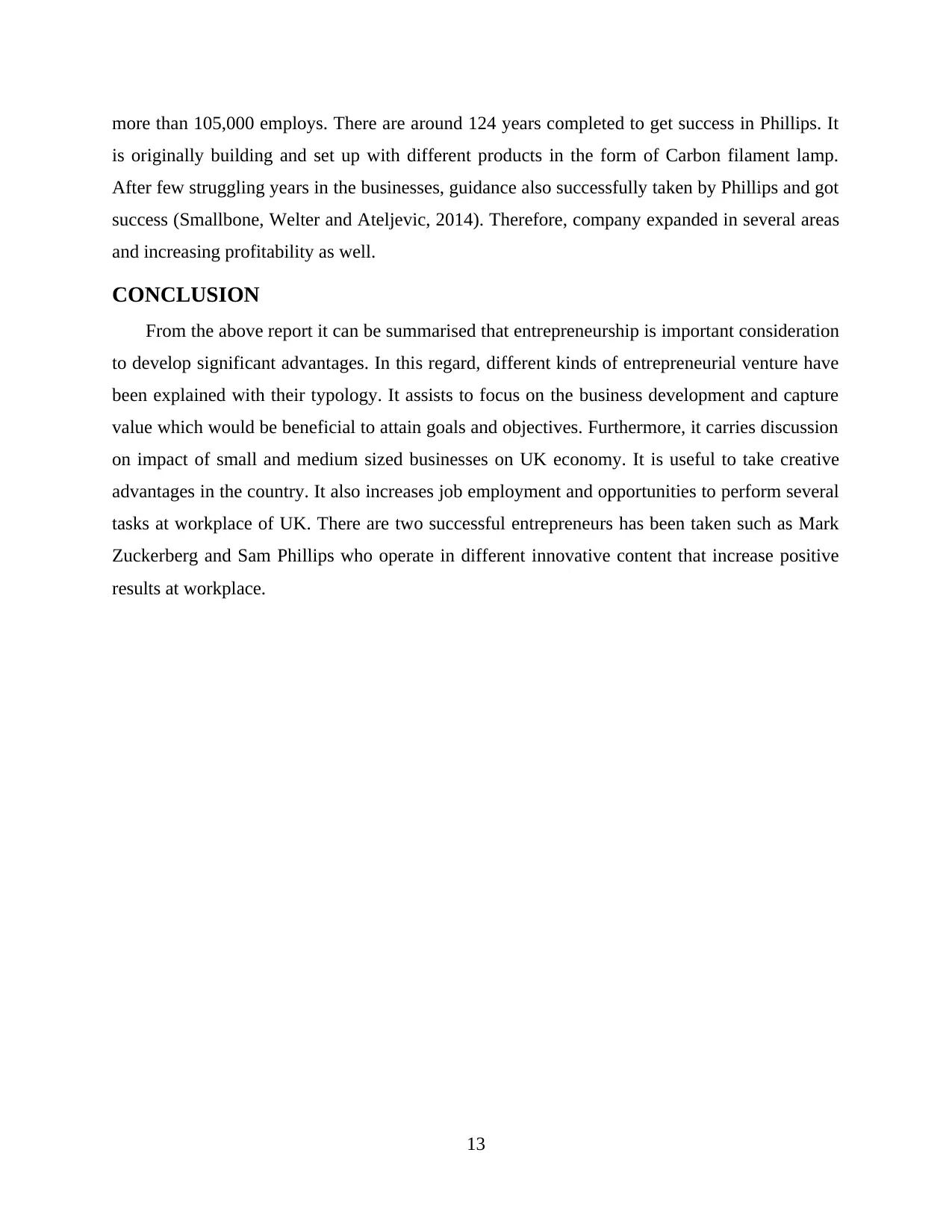
more than 105,000 employs. There are around 124 years completed to get success in Phillips. It
is originally building and set up with different products in the form of Carbon filament lamp.
After few struggling years in the businesses, guidance also successfully taken by Phillips and got
success (Smallbone, Welter and Ateljevic, 2014). Therefore, company expanded in several areas
and increasing profitability as well.
CONCLUSION
From the above report it can be summarised that entrepreneurship is important consideration
to develop significant advantages. In this regard, different kinds of entrepreneurial venture have
been explained with their typology. It assists to focus on the business development and capture
value which would be beneficial to attain goals and objectives. Furthermore, it carries discussion
on impact of small and medium sized businesses on UK economy. It is useful to take creative
advantages in the country. It also increases job employment and opportunities to perform several
tasks at workplace of UK. There are two successful entrepreneurs has been taken such as Mark
Zuckerberg and Sam Phillips who operate in different innovative content that increase positive
results at workplace.
13
is originally building and set up with different products in the form of Carbon filament lamp.
After few struggling years in the businesses, guidance also successfully taken by Phillips and got
success (Smallbone, Welter and Ateljevic, 2014). Therefore, company expanded in several areas
and increasing profitability as well.
CONCLUSION
From the above report it can be summarised that entrepreneurship is important consideration
to develop significant advantages. In this regard, different kinds of entrepreneurial venture have
been explained with their typology. It assists to focus on the business development and capture
value which would be beneficial to attain goals and objectives. Furthermore, it carries discussion
on impact of small and medium sized businesses on UK economy. It is useful to take creative
advantages in the country. It also increases job employment and opportunities to perform several
tasks at workplace of UK. There are two successful entrepreneurs has been taken such as Mark
Zuckerberg and Sam Phillips who operate in different innovative content that increase positive
results at workplace.
13
Secure Best Marks with AI Grader
Need help grading? Try our AI Grader for instant feedback on your assignments.
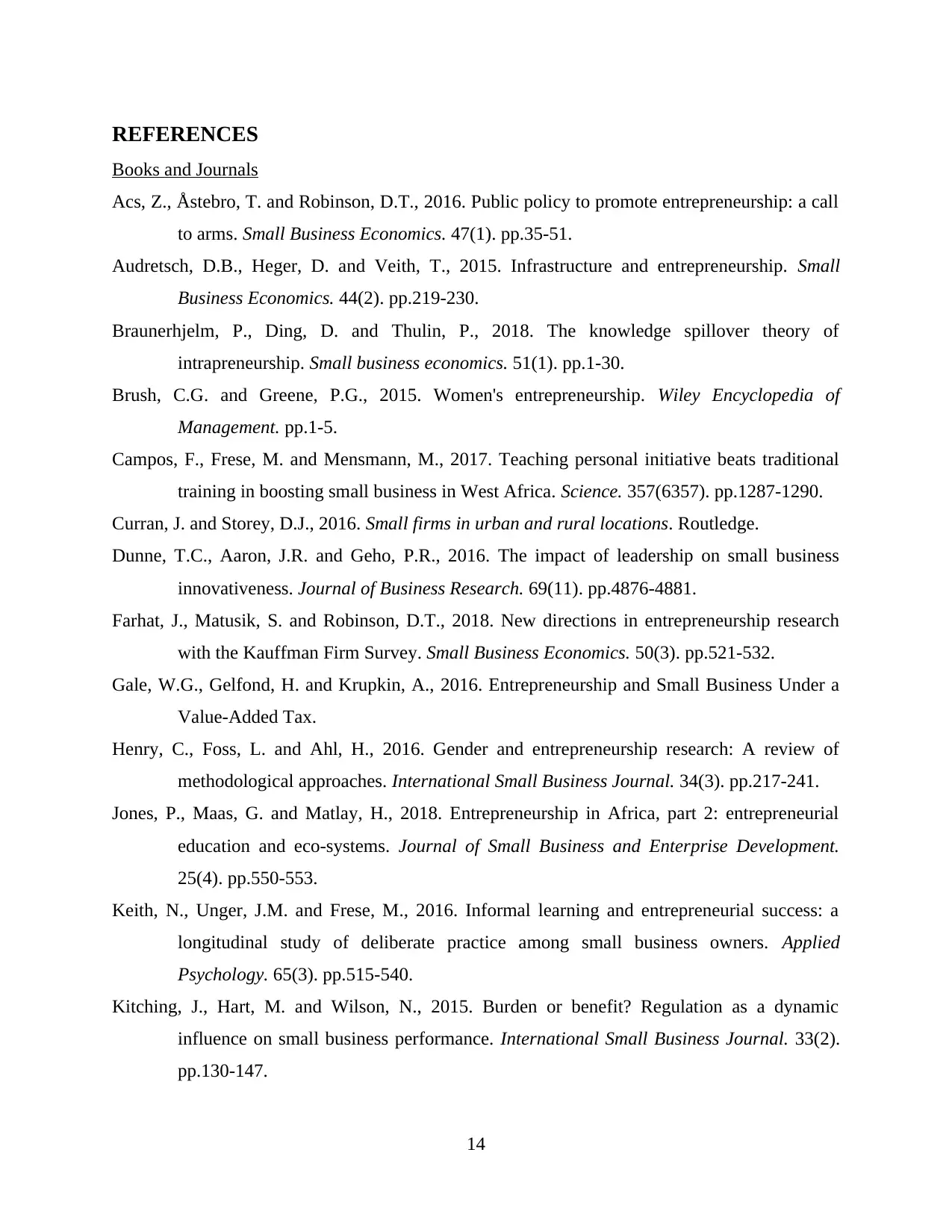
REFERENCES
Books and Journals
Acs, Z., Åstebro, T. and Robinson, D.T., 2016. Public policy to promote entrepreneurship: a call
to arms. Small Business Economics. 47(1). pp.35-51.
Audretsch, D.B., Heger, D. and Veith, T., 2015. Infrastructure and entrepreneurship. Small
Business Economics. 44(2). pp.219-230.
Braunerhjelm, P., Ding, D. and Thulin, P., 2018. The knowledge spillover theory of
intrapreneurship. Small business economics. 51(1). pp.1-30.
Brush, C.G. and Greene, P.G., 2015. Women's entrepreneurship. Wiley Encyclopedia of
Management. pp.1-5.
Campos, F., Frese, M. and Mensmann, M., 2017. Teaching personal initiative beats traditional
training in boosting small business in West Africa. Science. 357(6357). pp.1287-1290.
Curran, J. and Storey, D.J., 2016. Small firms in urban and rural locations. Routledge.
Dunne, T.C., Aaron, J.R. and Geho, P.R., 2016. The impact of leadership on small business
innovativeness. Journal of Business Research. 69(11). pp.4876-4881.
Farhat, J., Matusik, S. and Robinson, D.T., 2018. New directions in entrepreneurship research
with the Kauffman Firm Survey. Small Business Economics. 50(3). pp.521-532.
Gale, W.G., Gelfond, H. and Krupkin, A., 2016. Entrepreneurship and Small Business Under a
Value-Added Tax.
Henry, C., Foss, L. and Ahl, H., 2016. Gender and entrepreneurship research: A review of
methodological approaches. International Small Business Journal. 34(3). pp.217-241.
Jones, P., Maas, G. and Matlay, H., 2018. Entrepreneurship in Africa, part 2: entrepreneurial
education and eco-systems. Journal of Small Business and Enterprise Development.
25(4). pp.550-553.
Keith, N., Unger, J.M. and Frese, M., 2016. Informal learning and entrepreneurial success: a
longitudinal study of deliberate practice among small business owners. Applied
Psychology. 65(3). pp.515-540.
Kitching, J., Hart, M. and Wilson, N., 2015. Burden or benefit? Regulation as a dynamic
influence on small business performance. International Small Business Journal. 33(2).
pp.130-147.
14
Books and Journals
Acs, Z., Åstebro, T. and Robinson, D.T., 2016. Public policy to promote entrepreneurship: a call
to arms. Small Business Economics. 47(1). pp.35-51.
Audretsch, D.B., Heger, D. and Veith, T., 2015. Infrastructure and entrepreneurship. Small
Business Economics. 44(2). pp.219-230.
Braunerhjelm, P., Ding, D. and Thulin, P., 2018. The knowledge spillover theory of
intrapreneurship. Small business economics. 51(1). pp.1-30.
Brush, C.G. and Greene, P.G., 2015. Women's entrepreneurship. Wiley Encyclopedia of
Management. pp.1-5.
Campos, F., Frese, M. and Mensmann, M., 2017. Teaching personal initiative beats traditional
training in boosting small business in West Africa. Science. 357(6357). pp.1287-1290.
Curran, J. and Storey, D.J., 2016. Small firms in urban and rural locations. Routledge.
Dunne, T.C., Aaron, J.R. and Geho, P.R., 2016. The impact of leadership on small business
innovativeness. Journal of Business Research. 69(11). pp.4876-4881.
Farhat, J., Matusik, S. and Robinson, D.T., 2018. New directions in entrepreneurship research
with the Kauffman Firm Survey. Small Business Economics. 50(3). pp.521-532.
Gale, W.G., Gelfond, H. and Krupkin, A., 2016. Entrepreneurship and Small Business Under a
Value-Added Tax.
Henry, C., Foss, L. and Ahl, H., 2016. Gender and entrepreneurship research: A review of
methodological approaches. International Small Business Journal. 34(3). pp.217-241.
Jones, P., Maas, G. and Matlay, H., 2018. Entrepreneurship in Africa, part 2: entrepreneurial
education and eco-systems. Journal of Small Business and Enterprise Development.
25(4). pp.550-553.
Keith, N., Unger, J.M. and Frese, M., 2016. Informal learning and entrepreneurial success: a
longitudinal study of deliberate practice among small business owners. Applied
Psychology. 65(3). pp.515-540.
Kitching, J., Hart, M. and Wilson, N., 2015. Burden or benefit? Regulation as a dynamic
influence on small business performance. International Small Business Journal. 33(2).
pp.130-147.
14
1 out of 17
Related Documents
Your All-in-One AI-Powered Toolkit for Academic Success.
+13062052269
info@desklib.com
Available 24*7 on WhatsApp / Email
![[object Object]](/_next/static/media/star-bottom.7253800d.svg)
Unlock your academic potential
© 2024 | Zucol Services PVT LTD | All rights reserved.





